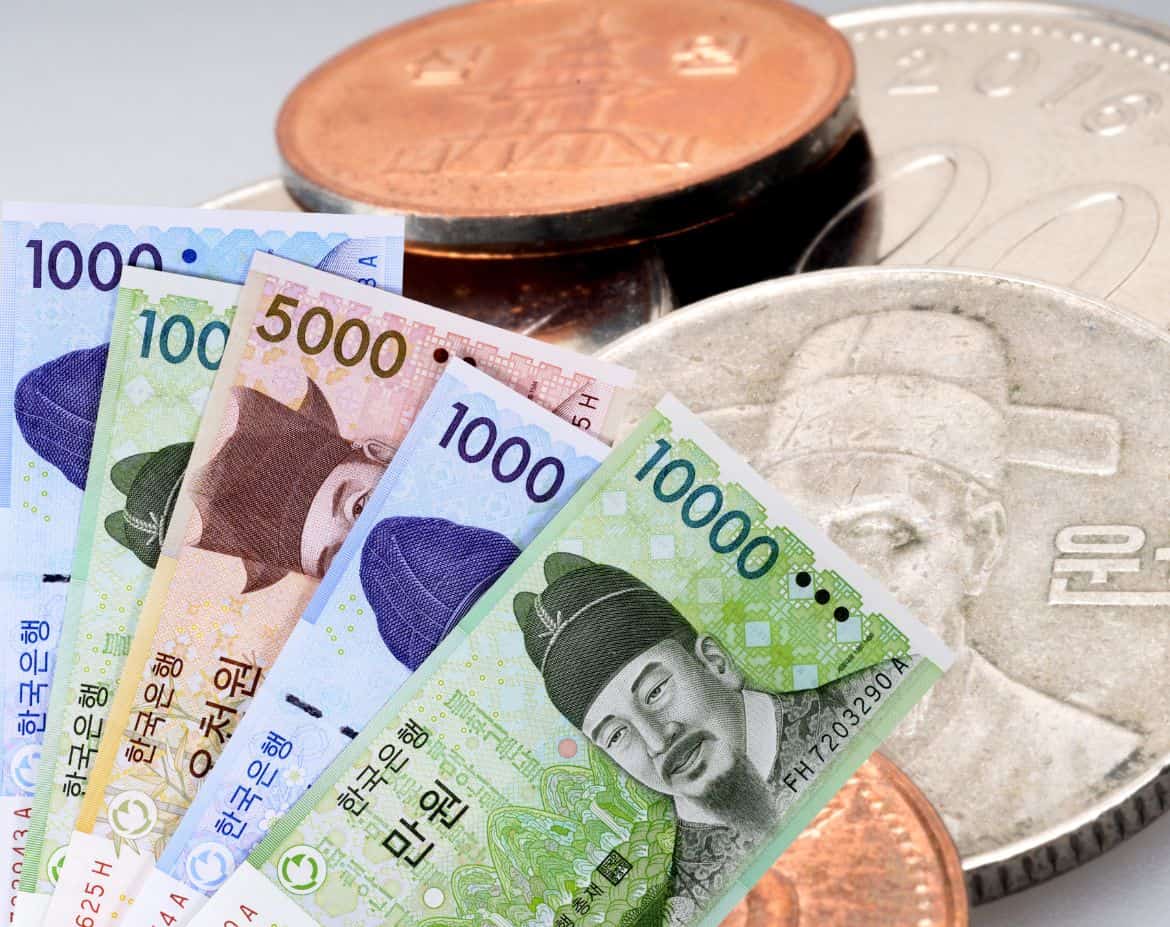If you’re planning a trip to Seoul or another popular tourist destination in South Korea, it’ll be important to consider exchanging some of your cash for the local currency.
In this post, I'll combine tips and useful information about the type of money used in South Korea to help you understand exchange rates, where to exchange, whether or not you can use credit cards and more.
I lived in the Seoul suburb of Bundang, South Korea, teaching English for a year, and have been back many times to visit.

What Currency is Used in South Korea
The official currency of South Korea is the South Korean won.
Since this currency is only used in this country, you'll likely need to visit an exchange office or get currency before you arrive.
Almost all businesses accept credit or debit cards, so it’ll really be up to you whether or not you want to get some cash.
However, cash is recommended if you will be visiting more rural locations.
Denomination of South Korean Won Banknotes and Coins
What I love about Won is how large it feels as an American. Because the notes are in the ten-thousands, I was technically a millionaire with my salary.
- The Won banknotes are available in four denominations of ₩1,000, ₩5,000, ₩10,000, ₩50,000
- The coin series is available in four denominations of 10c, 50c, 100c, 500c.
A few South Korean businesses in major cities will accept USD, but change will be given in won. I would not rely on this; you should expect that only won will be accepted as cash.
This isn’t a problem for most travelers, as they can use their credit or debit card, but if you plan to use cash, you'll need the local currency.
Exchange Rates for the Won
As with every form of currency worldwide, the exchange rate depends on various factors related to market conditions.
Having currency with such large denominations might feel strange, but my trick was just to treat things as the equivalent.
- 10,000 = $10 (again, this is not the exchange rate, but it's close enough to make the mental math easier! As of Jan 2024, the exchange rate is more like $ 7 USD for ₩10,000.
Currency Exchange Offices: You’ll find these offices located in various key areas around the city, at the airport, and near major train stations as well.
It’s usually recommended to avoid the airport because they usually offer the worst exchange rates.
Banks: You’ll find these located all over the city. Banks usually offer travellers a better rate than other locations.
ATMs: All ATMs in Seoul will allow you to exchange whatever money you have in your bank account or on your credit card for won, and they usually provide reasonable exchange rates. Avoid the ATMs in convenience stores if possible, as they have many extra fees and the worst rates.
ATMs are not always available 24/7, but most can operate in English. There are daily limits on individual machines, from 300,000 - 700,000. Unless you're going to purchase something immediately, I would not carry that much cash!
Hotels: Some hotels in Seoul will offer currency exchange, but chances are their exchange rates will be very bad, so we recommend avoiding this option.
Cash vs Credit Cards
In South Korea, using credit or debit cards is a great option. South Koreans use credit cards for most transactions.
That said, there are some cases where you might want to visit a bank or ATM and take out at least a few thousand Won.
Small restaurants or markets, street food vendors, and stores in rural areas will require cash. Cash is also necessary for bus fare.
Visa, Mastercard, and American Express are all accepted in South Korea and most places do not have minimum purchases to use a card.
Keep Card Transaction Fees in Mind
You can still expect your bank or credit card company to charge transaction fees for using your card in another country unless you have a special travel card that does not have foreign transaction fees.
If a store asks you which currency you want to pay in, I suggest paying in won and letting your bank do the conversation as you'll get a better rate!
Tips From Locals and Travelers
Some of the best areas of Seoul to find good rates and low fees for currency exchange are the neighborhoods of Itaewon and Myeondong.
The exchange offices here are often open until 9 pm, but some are even open 24 hours.
You are required to present a passport when exchanging currency, so keep that in mind if you're planning to do this while out for the day.
If you have a 5-6 digit pin number for your bank card, change it to a 4 digit pin before you arrive as most Korean ATMs only accept 4 digit pins.



